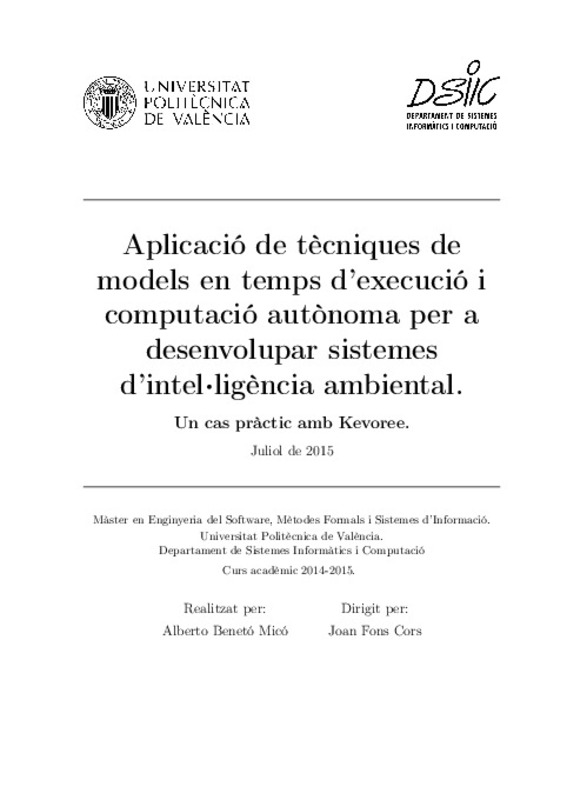|
Resumen:
|
[EN] In this final master paper, we will discuss and work on the principles of autonomic computing and self adaptability, by designing a little prototype of system into ambit of ambient intelligence.We define a system able ...[+]
[EN] In this final master paper, we will discuss and work on the principles of autonomic computing and self adaptability, by designing a little prototype of system into ambit of ambient intelligence.We define a system able to respond to different environmental stimuli, capable of self-management and self-adapt to different cases and scenarios of the system. We follow a model-driven approach, and more particularly, a model-driven approach runtime. With this approach, we aim to get a model that accurately defines the system and can be altered without disrupting the proper functioning of the system.On this basis, we intend to generate a prototype with a simulated behavior that allows us to have a ubiquitous system that adapts to change, defined with models that have the advantage of being easily modified at runtime. These fully define the system, give us a high-level view of what it is, and make easy to model and implement the system. The advantage that gives us is that we can change at runtime this model and apply it in a way that faithfully translated into the system.To develop our prototype we use Kevoree, a tool that will allow us to develop, through model@run.time techniques, a prototype applied to the ambit of ubiquitous systems.In addition, we will detail the methodology we followed for our developments. In the world of software engineering it is vital the organization and monitoring of guidelines and a clear methodology to guide our work toward the goal we want to achieve successfully.
[-]
[ES] En este trabajo de fin máster expondremos y trabajaremos sobre los principios de computación autónoma y auto adaptabilidad de sistemas aplicados a un escenario englobado en el ámbito de la inteligencia ambiental.Queremos ...[+]
[ES] En este trabajo de fin máster expondremos y trabajaremos sobre los principios de computación autónoma y auto adaptabilidad de sistemas aplicados a un escenario englobado en el ámbito de la inteligencia ambiental.Queremos definir un sistema capaz de responder a diferentes estímulos del entorno, capaz de autogestionarse y auto adaptarse a diferentes casos y escenarios del sistema. Seguiremos un enfoque orientado a modelos, y más concretamente a un enfoque orientado a modelos en tiempo de ejecución. Con esto, pretendemos conseguir un modelo que define fielmente el sistema y que se puede alterar sin interrumpir el funcionamiento adecuado del mismo.Sobre estas bases, pretendemos generar un prototipo con un comportamiento simulado que nos permita tener un sistema ubicuo y que se adapte al cambio, definido con modelos que tienen la ventaja de poder ser modificados fácilmente en tiempo de ejecución. Estos definen completamente el sistema, nos dan una visión de alto nivel de lo que es, y nos facilitan la tarea de modelar e implementar todo el sistema. La ventaja que nos aporta es que podemos modificar en tiempo de ejecución este modelo, y aplicarlo de forma que se plasme fielmente en el sistema.Para desarrollar nuestro prototipo presentaremos Kevoree, una herramienta que nos permitirá desarrollar, mediante técnicas model@run.time, el prototipo de un sistema aplicado al ámbito de la inteligencia ambiental.Además, detallaremos la metodología de trabajo hemos seguido para realizar nuestros desarrollos. En el mundo de la ingeniería del software, es vital la organización y el seguimiento de unas pautas y una metodología claras, para poder orientar nuestro trabajo hacia la meta que queremos conseguir y poder alcanzar con éxito.
[-]
|







